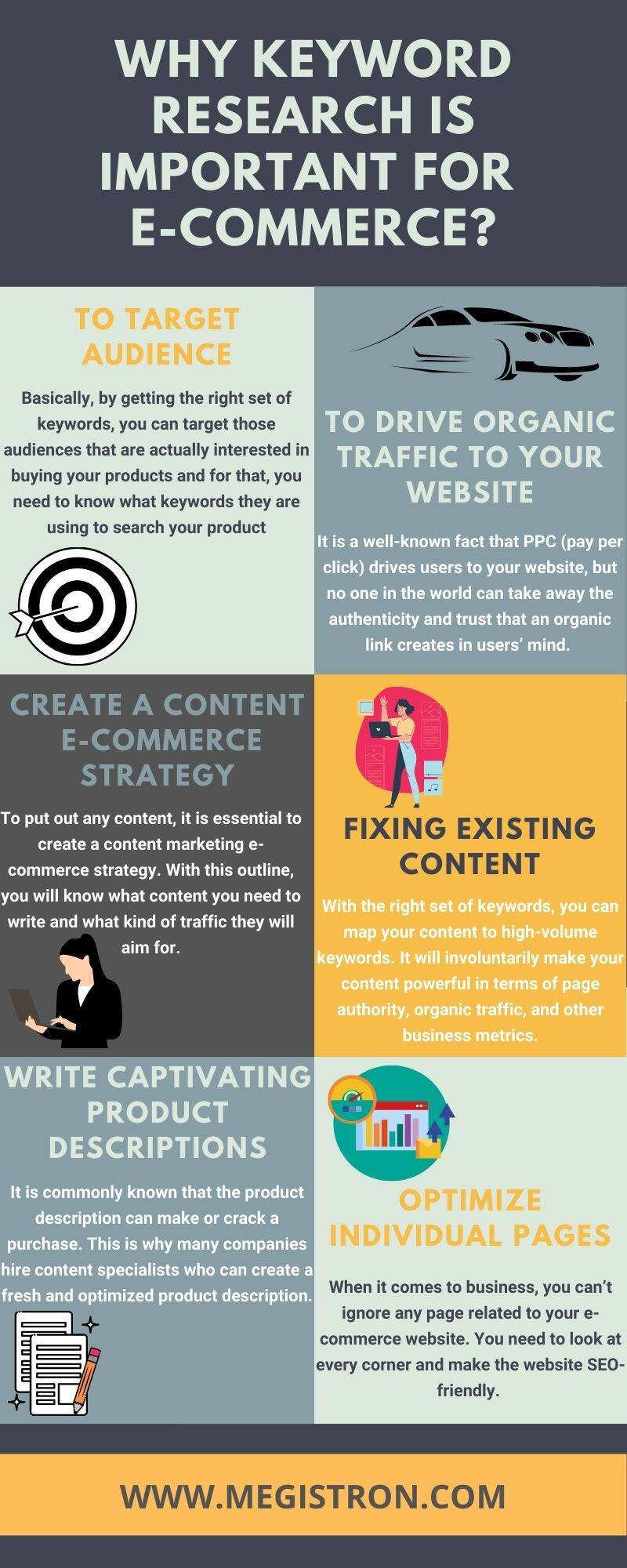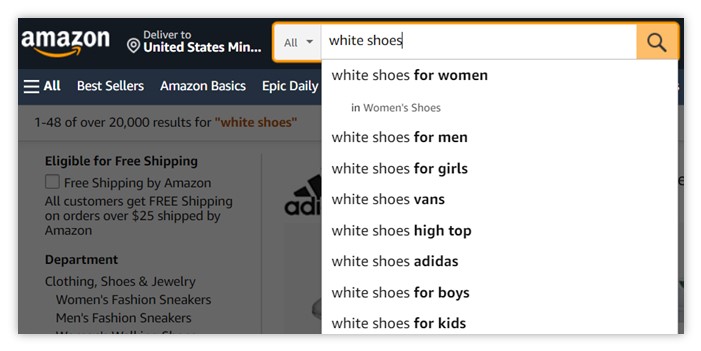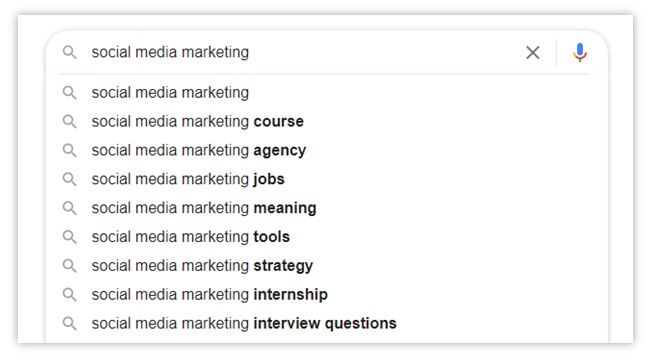Most online traffic reaches your website from the results displayed on the SERPs; hence choosing the relevant keywords in accordance with the search engine’s algorithm is essential. Search engine optimization encompasses many tactics to rank higher in the SERPs and one of the foundational principles include conducting proper keyword research. Keyword research is the simple art of better understanding the terminology your potential customers use to find the products you are selling. It helps the largest search engine – Google and other search engines decide what your e-commerce website is all about. The high traffic relevant keywords help bring quality traffic to your webpage and you should consider writing great product page descriptions to improve conversion rate, increase sales, etc.
Well, without a doubt, it’s more complicated than you think. This article will guide you through each nuance of keyword research which is the most integral part of SEO (search engine optimization).
By conducting proper e-commerce keyword research, you can understand what the audience is looking for — knowing what people are searching for also guides you to write great content that can bring more valuable traffic to your website. Inserting high-traffic keywords increases the quality of your website that Google always appreciates.
What do you understand by e-commerce keywords?

E-commerce keywords are no different from regular keywords. They are single words or phrases. These words cover the real sense that your product, service, or e-commerce site wants to convey. They describe the content of a website or a webpage and help search engines result in a page to an appropriate search query.
The keywords are distributed into two parts; short-tail and long-tail.
Short tail keywords: They contain three or lesser words. These keywords rank higher and are extremely common. Users just search these keywords when they want many options as a result. Such keywords complete their need by giving tons of choices.
Long-tail keywords: These are the phrases searched by users who know what they are looking for. Long-tail keywords are less competitive and more conversion-driven as compared to short-tail keywords.
Why keyword research is important for e-commerce?

For instance, let’s suppose that you write the title and description for any product available on your e-commerce website, but you don’t include any words related to users’ search. This could be a terrible idea that could affect your website’s ranking in the wrong way. This particular action can ghost your product, and the users would be left knowing nothing about the product’s existence.
The whole idea of keyword research is to clutch and maintain SEO ranking on the first page of SERPs and present your website for the phrases being used by the customers to find products that are available on your e-commerce website. Knowing what people are looking for gives you an idea to write a meta description, create meta tags and titles. With the inclusion of the right keywords, you can clutch a position at the top of SERPs. By doing so, you are sending a signal to the search engine crawlers to recognize the content of your website.
Below are the reasons why you need to research top e-commerce keywords for your business.

- To target audience

By getting the right set of keywords, you can target audiences interested in buying your products and for that, you need to know what keywords they are using to search your product. When the content matches the users’ queries, it makes your website demandable as in its crowning, or in this case, top ranking on the SERPs. This uplifts your e-commerce strategy to another level, plus it will lead a step closer towards understanding the users’ needs that may further convert them into potential buyers.
- Drive organic traffic to your website

There are different ways to drive users to your website, but an organic link works for the best. It doesn’t matter how much your PPC (pay per click) ad benefits you with the customers. The authenticity and trust of an organic link in the user’s mind are far better. If you want to drive organic traffic to your website, it is crucial to rank for the most searched keywords. This will create a trusting image of your e-commerce website in the visitor’s eye.
- Build a content strategy
It is essential to create a content marketing e-commerce strategy to put out any content. With the help of top e-commerce keywords, you can adopt a general framework to create content around. You can hire a content specialist to create great content for your website. You can easily construct web page content or social media captions and determine what to write about and whom to aim it at with correct keywords. You can also ascertain important content KPIs to help track its performance. This will give you a clear idea of writing appropriate content that can describe your product and aim for the right traffic.
- Fixing existing content
If you are a new business website, it might be possible that your content is not as powerful as it could be. This could happen because of feeble writing, lack of appropriate keywords, and even broken links. Commonly, many companies learn about SEO well after they start publishing content. With the right set of keywords, you can map your content to high-volume keywords that can make your content powerful in page authority, organic traffic, and other business metrics.
- Write captivating product descriptions
It is commonly known that the product description can make or break a purchase. This is why many companies hire a digital marketing agency that hires content specialists who can create a fresh and optimized product description. With the help of e-commerce keyword research, you will be updated with trending products and product categories. So, adding keywords while writing product descriptions can bring genuine visitors to the website. You can also opt for social media marketing, email marketing, e-commerce remarketing of these products.
- Optimize individual pages
You mustn’t ignore any page on your e-commerce website. To make the website SEO-friendly, you need to look into every crook and cranny. The content should be created with the target keywords in the optimization process. Your e-commerce strategy pays off when your home page ranks for certain related keywords on the SERPs. Other than using keywords, it is equally important to optimize the images. Working on the link-building techniques, using rich snippets, and maintaining the site speed also helps rank any e-commerce website.
What kind of keywords matter for an e-commerce website?
While performing e-commerce keyword research, it is imperative to know about general keywords and keywords with commercial intent. Without a doubt, general keywords are high-traffic, but they might not be suitable for commercial intent.
The point here is to explain what keywords can help you gain customers, as the primary purpose here is to increase brand awareness and make as many sales as possible.
For example, a person searching for “shoes” is obviously at the beginning of the buying cycle. The person is not having any clear intent and wants an overview of the product. On the other hand, long-tail keywords are more precise and better explain the user’s intent. For example, a user searching for “black shoes” can have the intention of buying more shoes than those above.
The reason for mentioning the above examples is to clarify that you need to include those keywords that have a particular intent instead of running towards popular search volume keywords. Just remember that you need those keywords which in no time can target users who are on the stage of converting into your customer.
How to discover keywords for your e-commerce products?
Now, let’s find out how to discover those keywords that have commercial intent and are easier to target.
- Go to Amazon
According to research, it is seen that the first thing that comes to users’ minds when talking about e-commerce is Amazon. The biggest e-commerce platform online users prefer to start their search with and not on Google or any other search engine. So, it is a reliable way to get some traffic- drawing keywords for your product.
Just go to Amazon, search for your product, and it will suggest a list of keywords people are searching around that product.
Now you have the most popular brand and categories at a glance. Now select a category and look into the left sidebar.
You will find the top categories related to your product. These products could be the best candidate for your pages.

- Use Google search
The best way to start your keyword research is by visiting Google. Go to Google, type your keywords, and as soon as you start typing, it will give you suggestions on how to finish your search query. Always keep your search limited to 2-3 words, for example: ‘social media marketing.
Scroll down at the bottom of the page and have a ‘related searches’ section. Now take note of the terms related to your product and go back to excellent again and repeat your search. You can repeat this process many times until you have a list of relevant keywords.

- Use the power of the keyword tool
With all the keywords gathered, now it’s time to go to any keyword research tool that you use. A keyword research tool like Google ads keyword planner tool or Google trends gives you a better insight into the search volume, competition, and keyword difficulties of your keywords, which will help you decide how to optimize product pages.
Many tools are available, but SEMrush keyword tool and Ahrefs are the industry’s favorite. Let’s take how SEMrush keyword tool works, for instance. So once you are logged in to the SEMrush keyword tool, go to SEO keyword magic from the left menu bar (under keyword analytics).
You can start by typing the keywords that you have gathered from Amazon and Google. You will be looking for keywords with high search volume. This tool also suggests a range of long-tail keywords that you can use for your products. You can combine these keywords with your brand name and products to optimize your product pages perfectly.

- Use keywords your competitor ranks for
This is a simple process if you’re using the right tool. Here, please search for your keyword on Google and look for other websites ranking for it. Don’t consider big websites like Amazon but websites similar to your e-commerce store. Take their domain, go to SEMrush keyword tool, and select the URL under domain analytics. It will give you a set of keywords that your competitors are ranking for and you can use them naturally on your product pages to increase your chances of ranking. This can be a beneficial step in your process to rank quickly.
- Use Wikipedia
The final step of the process is going to Wikipedia to find related keywords for your term. Find the articles related to the topics in your niche and try to understand the keywords used in those articles that can benefit your content.
Closing thoughts
Although it is a well-known fact that e-commerce keyword research requires a lot of time and demands a lot of work, with the correct e-commerce strategy, you can get marvelous results for your website. All the hard work indeed pays you off when you finally implement the selected set of keywords in your e-commerce store. It will also affect the search volume positively and optimize the website with no regrets.
Over time, implementing the right set of keywords also results in higher page rank. You will attract more visitors to your website that will be willing to convert as fruitful customers. You can also track the conversion through Google analytics and Google ads. It is the best practice that works to better your website’s visibility, increment of the sale, and conversion rate.
I hope you find the article helpful and if you want to perk up page rank, sales and magnetize more users to your e-commerce website, you can opt for our SEO audit services.

